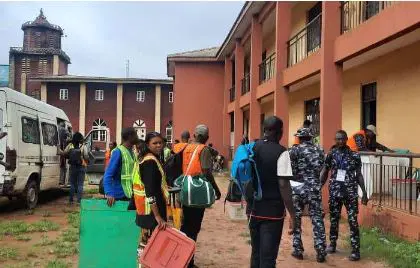The Federal Government has announced the reintroduction of school health programme aimed at addressing the physical and mental health needs of adolescents.
The government stated that the initiative is designed to provide comprehensive health support to students, ensuring they have access to essential healthcare services within schools, with focus on improving both their physical well-being and mental resilience.
The Coordinating Minister of Health and Social Welfare, Prof. Muhammad Pate, made the announcement on Thursday in Abuja while fielding questions at a news conference to mark 2024 International Adolescent Health Week.
The News Agency of Nigeria reports that IAHW is an annual, international week (Oct. 7 – Oct. 13) to advocate for a successful transition into adulthood.
The 2024 edition of the global observance has “Thriving, Not Surviving: Building Adolescents’ Resilience” as its theme.
Pate, represented by Ms Daju Kachollom, the Permanent Secretary in the ministry, explained that the School Health Programme would teach adolescents how to prioritise their physical and mental health, while focusing on hygiene and nutrition.
According to him, this year’s IAHW theme serves as a call to action, ensuring that today’s youths are growing, flourishing and equipped to navigate life’s challenges with resilience, strength and confidence.
He said “adolescence is a critical stage of life, a time of rapid physical, emotional, and mental development. However, it is also a period marked by vulnerabilities.”
He added that adolescents face challenges such as mental health issues, gender-based violence, substance abuse, risky sexual behaviours and bullying, in addition to structural barriers like poverty, poor access to quality healthcare, and lack of education.
The minister said “as we gather here today, remember that adolescents are not merely our future but a vital part of our present. Their health and well-being will determine the trajectory of our nation’s progress.
“Ensuring their health and resilience is not just an investment in their personal future, but in the future of our communities, economy and country.”
He stressed the role of policymakers, health practitioners, educators and community leaders in creating environments that nurture adolescents’ resilience by providing access to comprehensive healthcare, mental health support, quality education and safe spaces.
One of the most pressing issues facing adolescents today, according to Pate, is the rise of mental health disorders like depression and anxiety, with many young people suffering in silence due to stigma, lack of awareness and insufficient access to care.
“The Ministry of Health is committed to breaking this silence,” he said, adding that the ministry had established the National Mental Health Programme to raise awareness, reduce stigma, and provide adolescents with the support and care they need.
“Just like physical health, mental health must be treated with urgency and importance,” he said.
On her part, Kachollom, represented by Dr Binyerem Ukaire, Director, Family Health Department, she explained that the commemoration of IAHW serves as a reminder of the collective responsibility to protect, nurture and empower adolescents.
Kachollom encouraged health professionals, policymakers, educators, parents, and the media to work toward a future where every adolescent can thrive.
Meanwhile, Mrs Oyeyemi Pitan, Executive Director of GEM Hub Initiative, reassured adolescents of Civil Society Organisations (CSOs) support, adding that the initiative is committed to ensuring that young people not only survive but thrive.
Pitan noted that life skill programmes which focus on healthy behaviours, emotional intelligence, decision-making skills, substance abuse, sexual health and stress management, are vital for empowering youths.
Mrs Maimuna Abdullahi, a Health Economist and Monitoring & Evaluation Specialist at the African Health Budget Network (AHBN), said AHBN would continue to ensure that adolescents have access to quality healthcare.
Abdullahi explained that “the network creates safe spaces for youths to talk about mental health issues without stigma and provides trained counsellors to address the unique challenges faced by adolescents.
NAN





















